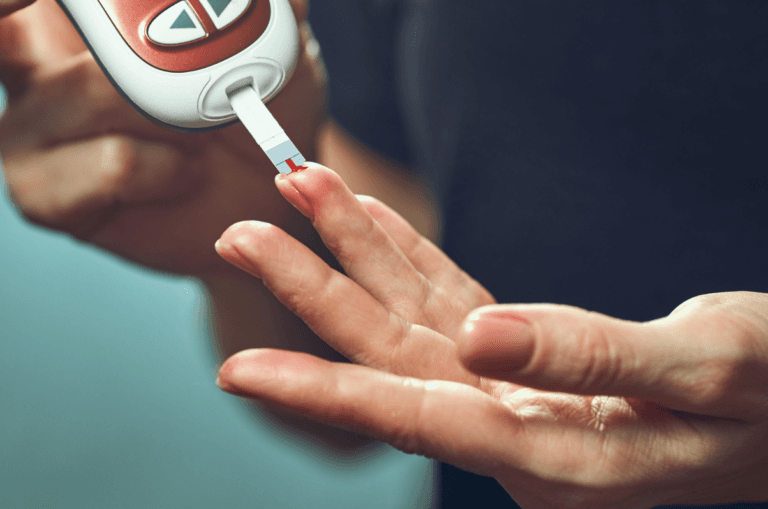
Living with diabetes or prediabetes can be challenging, but making simple lifestyle changes can help you manage your condition and achieve a healthier life. Lifestyle management is a fundamental aspect of diabetes care. In this blog post, we’ll explore five easy lifestyle adjustments that anyone can make to keep their blood sugar levels in check and reduce the risk of diabetes complications.
What is diabetes?
Diabetes is a chronic condition where the body has difficulty producing or utilising insulin. There are three main types of diabetes: Type 1 diabetes, Type 2 diabetes, and gestational diabetes. Type 1 diabetes is an autoimmune disease where the body attacks and destroys insulin-producing cells in the pancreas. Type 2 diabetes occurs when the body becomes resistant to insulin, and the pancreas has to work harder to produce enough to regulate blood sugar levels. Gestational diabetes is a type of diabetes that develops during pregnancy and usually disappears after giving birth. It can happen at any stage of pregnancy but is more common in the second or third trimester. Pre-diabetes is a condition where blood sugar levels are higher than normal, but not yet high enough for a diabetes diagnosis. However, if left untreated, pre-diabetes can progress to type 2 diabetes. Various risk factors, such as obesity, leading a sedentary lifestyle, and having a family history of diabetes, can increase the likelihood of developing type 2 diabetes.
The good news is that making simple lifestyle modifications such as regular exercise, a healthy diet, and stress management can significantly improve diabetes management. By adopting these healthy habits, one can not only prevent pre-diabetes from progressing but also delay or avoid the onset of type 2 diabetes altogether.
Exercise regularly
Regular exercise is one of the most effective ways to manage diabetes. Even small changes in your fitness routine can make a big difference in controlling blood sugar levels and reducing the risk of complications such as heart disease, nerve damage, and vision problems. Weight loss will help reduce inflammation, which is a symptom of insulin resistance. Aim for at least 30 minutes of moderate-intensity activity five times a week, such as brisk walking, cycling or swimming.
Incorporating strength training into your exercise routine is also important for managing diabetes. Building muscle helps improve insulin sensitivity and glucose uptake by cells, which helps lower blood sugar levels. Consider using body weight, resistance bands or lifting weights two to three times per week, alongside aerobic exercises like jogging or dancing. By making regular exercise part of your daily routine you can enjoy better health outcomes while also improving overall quality of life through increased energy levels and reduced stress.
The NHS recommend adults:
- Do at least 150 minutes of moderate-intensity activity a week or 75 minutes of vigorous-intensity activity a week
- Spread exercise evenly over 4 to 5 days of the week
Eat a healthy diet
Maintaining healthy eating is crucial for managing diabetes. Focus on food choices that are high in fibre, such as whole grains, fruits and vegetables. Limit your intake of processed foods and sugary drinks to prevent spikes in blood sugar levels. Incorporating lean protein sources like chicken or fish can also help regulate blood sugar levels.
It’s important to be mindful of what you eat when managing diabetes. Reading nutrition labels can provide valuable information about the amount of carbohydrates, sugars and fats contained in food products. Making small adjustments to your diet by swapping out unhealthy options for healthier alternatives can have a significant impact on your overall health and well-being.
In addition to improving blood sugar control, a healthy diet also lowers the risk of cardiovascular disease, which is common in people with diabetes. By incorporating heart-healthy foods such as nuts, fatty fish and olive oil into your meal plan you may lower inflammation markers leading to better heart function overall. Furthermore, overweight or obese individuals are at higher risk for both type 2 diabetes and cardiovascular disease, so weight management through proper nutrition can aid in mitigating these risks, allowing you to live an active lifestyle, while being at less risk from further comorbidity issues down the road.
Foods to eat and avoid for managing diabetes
Managing diabetes requires conscious effort and discipline. One of the most important things you can do is to choose the right foods to eat while avoiding those that could aggravate your condition. As a general rule, stick to whole grains, non-starchy vegetables, lean protein sources like fish or chicken breast, and healthy fats from nuts and avocados.
On the other hand, it’s best to avoid processed food with added sugars. This includes sugary drinks like soda and fruit juices, as well as sweets such as candy or pastries. Be mindful of your carbohydrate intake by limiting bread, pasta, rice etc., which can spike blood sugar levels quickly if not controlled properly. Instead, opt for low-carb alternatives like zucchini noodles or cauliflower rice – they are just as delicious but with fewer carbs! Reducing portion sizes will also help to lower calorie intake. In addition, diet drinks and sports drinks that contain artificial sweeteners may also impact insulin sensitivity. To quench your thirst without spiking your blood sugar, opt for water.
Talk to your doctor, nurse or dietitian about the best food choices and the appropriate balance of food types.
Monitor your blood sugar levels regularly
Regularly monitoring your blood sugar levels is crucial for properly managing your diabetes. By keeping track of your levels, you can adjust your diet and medication accordingly to avoid dangerous spikes or dips in glucose. This simple habit could mean the difference between well-controlled blood sugar and a life-threatening emergency.
There are several ways to monitor your blood sugar levels, including finger pricks with a glucose meter, continuous glucose monitors (CGMs), and urine tests. Your healthcare team can help determine which method is right for you based on factors like cost, convenience, and accuracy. Regardless of the method chosen, it’s important to make regular testing is part of your routine, so that you can stay within a healthy range of your glucose levels.
Why monitoring blood sugar levels is important for managing diabetes
Here are a few reasons why monitoring your blood sugar levels is important for managing diabetes:
- Prevention of Hyperglycemia and Hypoglycemia: Monitoring your glucose levels can help you avoid dangerously high or low blood sugars that can lead to various health complications
- Early detection and treatment of high blood sugar: Regular monitoring helps catch any spikes in blood sugar early on, before they cause serious problems
- Understanding how certain foods affect your blood sugar: Knowing which foods raise or lower your glucose levels can help you make smarter dietary choices
By keeping an eye on your glucose numbers throughout the day, you’ll be better equipped to manage your diabetes effectively so that it doesn’t interfere with daily life.
How to monitor your blood sugar levels
Using a glucometer at home is an easy and efficient way to monitor your blood sugar levels. With just a small drop of blood, you can get accurate readings within seconds. It’s important to keep track of your readings by creating a daily log. This will help you identify patterns and make necessary adjustments to your diet and medication.
However, monitoring alone may not be enough to manage your diabetes effectively. Consulting with your healthcare provider for guidance on managing your condition is crucial. They may suggest a change in your diabetes medications. They can provide personalised recommendations based on factors such as age, weight, and overall health status that can help you maintain healthy glucose levels over time. Remember that keeping track of blood sugar levels is just one part of the equation; lifestyle changes like maintaining a healthy diet, healthy weight and exercise routine are equally important for diabetes management success!
Stop smoking
Smoking is a dangerous habit that can worsen your diabetes. It increases insulin resistance, damages blood vessels, and raises the risk of complications such as cardiovascular disease and kidney failure. Quitting smoking is one of the most important steps you can take to manage your diabetes and improve your health.
Here are some tips to quit smoking:
- Set a quit date and stick to it
- Seek support from friends, family or healthcare professionals
- Use nicotine replacement therapy or medications if needed
- Find alternative activities such as exercise or meditation to reduce stress
- Stay positive and remind yourself of the benefits of quitting
How smoking affects diabetes
Smoking is detrimental to overall health, but for those with diabetes, the harmful effects are amplified. Smoking increases insulin resistance and makes it harder for the body to regulate blood sugar levels. This can lead to complications such as nerve damage and cardiovascular disease. Smokers with diabetes have a higher risk of heart attack or stroke than non-smokers with diabetes.
Quitting smoking is crucial for managing diabetes and reducing the risk of further complications. By kicking this habit, you not only decrease your chances of developing nerve damage or cardiovascular disease, but also improve your overall health and well-being. Making small changes in lifestyle habits like quitting smoking can help manage diabetes effectively while improving life quality in general.
Tips to quit smoking
Nicotine addiction can be one of the biggest challenges when trying to quit smoking. Thankfully, there are various options available to help overcome this hurdle such as nicotine replacement therapy (NRT). Additionally, behavioural therapy and counselling can assist individuals in identifying triggers that lead to smoking and provide coping mechanisms.
Here are a few tips on quitting smoking:
- Consider using nicotine patches or gum as part of your NRT plan
- Consult with a therapist or counsellor for support during the quitting process
- Identify potential triggers that may cause you to smoke and work on finding alternative ways to respond
- Joining a support group can provide additional motivation and accountability
Remember, it’s possible to quit smoking even if it takes multiple attempts. Stay committed and seek out resources that will help make the process easier.
Reduce stress
Stress can have a significant impact on diabetes management, leading to high blood sugar levels and other complications. It’s essential to find ways to reduce stress in your daily life to maintain better control of your diabetes.
Here are some simple healthy lifestyle changes you can make that will help reduce stress and manage your diabetes:
- Practice relaxation techniques like deep breathing, meditation, or yoga
- Get regular exercise even just 30 minutes a day which releases endorphins and reduces stress hormones
Making these small changes can have a big impact on managing your diabetes while reducing the negative effects of stress on your body. Take action today for better health tomorrow!
How stress affects diabetes management
Stress can greatly impact diabetes management, making it more challenging to control blood glucose levels and increasing the risk of other health complications. Here are some ways stress affects diabetes:
- Increased blood glucose levels: When you’re stressed, your body releases hormones like cortisol and adrenaline that cause a spike in blood sugar levels
- Negative impact on insulin management: Stress also makes it harder for your body to properly use insulin, leading to further spikes in blood sugar
- Risk of developing other health complications: Long-term stress can increase the risk of heart disease, high blood pressure, high cholesterol and other serious health conditions
Individuals with type 2 diabetes need to take steps towards reducing stress in their daily lives.
Ways to reduce stress and manage diabetes
Regular physical activity, meditation or deep breathing exercises, and talking to a therapist or counsellor are three effective ways to reduce stress and manage diabetes. Engaging in regular exercise not only helps regulate blood sugar levels, but also promotes the release of endorphins, which can help alleviate feelings of stress. Meditation or deep breathing exercises can help lower cortisol levels in the body, reducing overall stress levels and improving mental health.
Talking to a therapist or counsellor can provide valuable support for managing both diabetes and stress. Diabetes management requires significant lifestyle changes that can be challenging for many people. Speaking with a professional who understands these challenges can help individuals develop coping strategies and find emotional support during this process.
Incorporating regular physical activity, practising mindfulness through meditation or deep breathing exercises, and seeking out therapy when needed are all simple yet powerful steps towards reducing stress and effectively managing diabetes for long-lasting health benefits.
Sources
- Physical activity guidelines for adults aged 19 to 64 – NHS
- Food and keeping active – NHS
- Eating with diabetes – Diabetes UK
- Diabetes and exercise – Diabetes UK
- Diabetes and your emotions – Diabetes UK
Medical Disclaimer
NowPatient has taken all reasonable steps to ensure that all material is factually accurate, complete, and current. However, the knowledge and experience of a qualified healthcare professional should always be sought after instead of using the information on this page. Before taking any drug, you should always speak to your doctor or another qualified healthcare provider.
The information provided here about medications is subject to change and is not meant to include all uses, precautions, warnings, directions, drug interactions, allergic reactions, or negative effects. The absence of warnings or other information for a particular medication does not imply that the medication or medication combination is appropriate for all patients or for all possible purposes.












